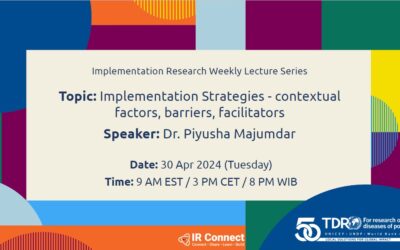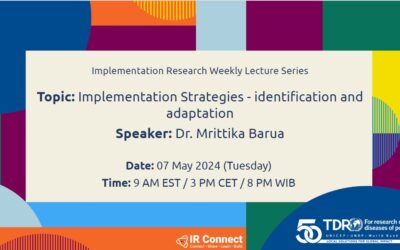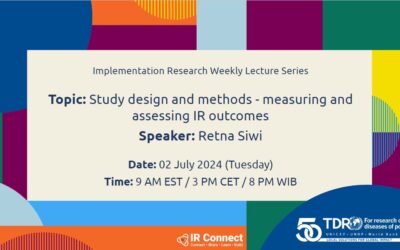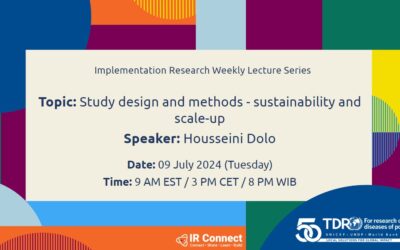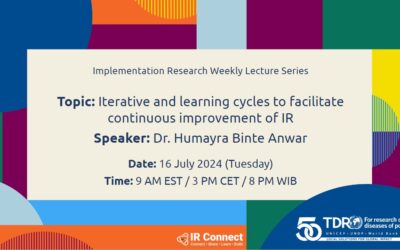ACTIVITIEs
WEBINAR on Bioethics: History, Current Scenario and Challenges – Radha Saini
Hosted by WHO-TDR IR Connect (10-November-2021) Speakers: Pham Huong Giang, UGM Dr Abhishek Royal, UGM
Trend analysis of childhood tuberculosis in bangladesh
Hosted by WHO-TDR IR Connect (10-November-2021) Speakers: Pham Huong Giang, UGM Dr Abhishek Royal, UGM
Implementation Strategies – contextual factors, barriers, facilitators – Dr. Piyusha Majumdar
Implementation Strategies – identification and adaptation – Dr. Mrittika Barua
Effective ingredients of evidence-informed interventions – Dr. Phyllis Dako-Gyeke
Conducting IR – fidelity and adaptation – Dr. Juliana Kagura
Conducting IR – gaps in IR measurement – Dr. Emmanuel Asampong
Conducting IR – internal validity – Dr. Franklin Glozah
Conducting IR – external validity / transferability – Jean Louis Abdourahim
Study design and methods – models/frameworks/study design – Dr Anna Kalbarczyk
Study design and methods – mixed and multi-methods approaches – Dr. Malabika Sarker
Study design and methods – measuring and assessing IR outcomes – Retna Siwi
Study design and methods – sustainability and scale-up – Housseini Dolo
Iterative and learning cycles to facilitate continuous improvement of IR – Dr. Humayra Binte Anwar
Translating IR results to policy and action – Dr. Yodi Mahendradhata
Communicating and advocating throughout the IR process – Dione Benjumea
Kunzang Dorji
Kunzang Dorji – A Deputy Chief Laboratory Officer/ Surveillance Officer, Royal Centre for Disease Control Department of Public Health, Ministry of Health, Bhutan. He is from Bhutan and an alumni of the WHO-TDR IR batch from the University of Gadjah Mada shares his...
Join us for the TDR Global Webinar on Immunization!
🤝 Explore the theme 'Revitalizing Immunization: Implementation Research for Strengthening Routine Vaccination Programs.' 🚀 Learn from renowned speakers Dr. Arindam Ray and Dr. Bibek Kumar Lal as they delve into the scope of implementation research in immunization...
Rajat Das Gupta
Rajat Das Gupta - A graduate research assistant at University of South Carolina. He is from Bangladesh and an alumni of the...
COVID-19 Vaccine hesitancy in West Africa
COVID-19 Vaccine hesitancy in West AfricaHosted by IR Connect, supported by WHO-TDRHeld on 29 April 2022Speakers: Alumni from GhanaCheick Oumar DoumbiaPhD Student, Bernhard Nocht Institute of Tropical Medicine.
Peace Alabi
Peace Alabi - A Public health officer in Nigeria and an alumni of the WHO-TDR IR batch from the University of...
Facilitators and Barriers to implementation of childhood tuberculosis in Bangladesh
Facilitators and Barriers to implementation of childhood tuberculosis in BangladeshHosted by IR Connect, supported by WHO-TDRHeld on 30 March 2022 Speakers: Alumni from BRAC Sandesh PanthaGeneral Practitioner, PhD student, Latrobe University, Australia.Uygen...
Tuberculosis: IR and way forward
Tuberculosis: IR and way forwardHosted by IR Connect, supported by WHO-TDRHeld on 24 November 2021Speakers: Alumni from UGMShraddha Acharya,Save the Children International.Dr. Marcelo Amaral Mali,Ministry of Health, and NGO (Operational Research).Shiva Poudel,Bagmati...
Barack Ernest Ahumah
Barack Ernest Ahumah - A senior optometrist and an alumni of the WHO-TDR IR batch from the University of Witwatersrand shares his experience of the IR...
Jean Claude Ouedraogo
Jean Claude Ouedraogo - A research assistant at Institut de Recherche enSciences de La Santé (IRSS/CNRST), Burkina Faso. He is from Burkina Faso and...
“Talk on Conducting IR During Pandemic”
Hosted by WHO-TDR IR Connect (10-November-2021)
Speakers: Pham Huong Giang, UGM Dr Abhishek Royal, UGM
Cheick Oumar Doumbia
Cheick Oumar Doumbia- The alumni of the WHO-TDR IR batch from the University of Ghana shares his experience of the IR program & the impact it has had on his career, in the interview of alumni spotlight series was organized by IR Connect.
Congratulations Sagun Paudel
We hereby announce the winners of TDR Global Asia Mentorship Contest 2021. The first winner will enter the global competition and compete with winners from TDR Global Africa and Latin America. Please kindly note that we will notify the winners via email as well.
The overall total score for each idea is calculated based on the total score for each judging criteria, number of judge’s vote and number of member’s vote.
We received 62 votes from TDR Global members. Most voted idea are: 24 votes for I CARE (Improving Communication And Reach) for public health researchers and 12 votes for IR- Mentor: A platform to connect Mentor and Mentee. This result shows that judges selection are similar with members selection.
Congratulations to all winners and we sincerely thank you for submitting your idea and voting your favorite idea. We couldn’t have done this without you. We also hope this contest also inspires other TDR Global members to create a better mentorship model in your institution.
Narcisse Tounaikok
Narcisse Tounaikok- The alumni of the WHO-TDR IR batch from the University of Ghana shares his experience of the IR program & the impact it has had on his career, in the interview of alumni spotlight series was organized by IR Connect.
Abebe Belete
Abebe Belete- The batch representative of the WHO-TDR IR batch from the University of Ghana shares his experience with the IR program & the impact it has had on his career. The alumni spotlight series was organized by WHO-TDR IR Connect.



